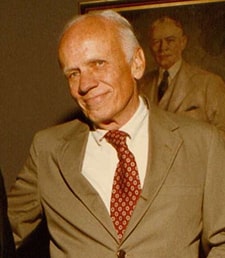Walker Percy (1916 – 1990) was a prolific American author whose work focused on philosophy and semiotics. Percy is noted for his philosophical novels set in and around New Orleans; his first, “The Moviegoer”, won the National Book Award for Fiction.
Percy, an orphaned child after his father’s suicide and his mother’s accident, went with his brothers to live with their father’s cousin (William Percy), a bachelor and lawyer, in Greenville, Mississippi.
After moving to Greenville, Mississippi, in 1930, Percy was introduced by William Percy to a neighboring youth his own age, Shelby Foote, who became his lifelong best friend. As young men, Percy and Foote decided to visit William Faulkner in Oxford, Mississippi. They were inspired by his work and were grateful to have the opportunity to meet him.
Percy studied at the University of North Carolina (B.A., 1937) and Columbia University (M.D., 1941) and, while working as a pathologist at Bellevue Hospital, New York City, contracted tuberculosis, compelling him to rest at an upstate New York sanatorium. While recovering he read widely, was attracted to the works of European existentialists, and decided on a career in writing.
In 1935, during the winter term of Percy’s sophomore year at Chapel Hill, he contributed four pieces to The Carolina Magazine. According to scholars such as Jay Tolson, Percy proved his knowledge and interest in the good and the bad that accompany contemporary culture with his first contributions. Percy’s first novel, “The Moviegoer”, tells the story of his experiences at Chapel Hill.
He worked on a second novel, “The Gramercy Winner”, but it was never published. Percy’s literary career as a Catholic writer began in 1956, with essays on race and religion in the Catholic magazine Commonweal. The essay “Stoicism in the South” condemns Southern segregation and demands a larger role for Christian thought in Southern life. He worked on a second novel, The Gramercy Winner, which was never published. Percy’s literary career as a Catholic writer began in 1956, with essays about race in the Catholic magazine Commonweal. The essay, “Stoicism in the South,” condemns Southern segregation and calls for a larger role for Christian thought in Southern life.
After many years of writing and rewriting in collaboration with editor Stanley Kauffmann, Percy published his first novel, The Moviegoer, in 1961. Percy later wrote of the novel that it was the story of “a young man who had all the advantages of a cultivated old-line southern family: a feel for science and art, a liking for girls, sports cars, and the ordinary things of the culture, but who nevertheless feels himself quite alienated from both worlds, the old South and the new America.
Later in his career, he wrote The Last Gentleman (1966), Love in the Ruins (1971), Lancelot (1977), The Second Coming (1980), and The Thanatos Syndrome (1987). Percy’s life and family legends were a source of inspiration and played a role in his writing. The Thanatos Syndrome is a story about one of Percy’s ancestors who was taken from a family chronicle written by Percy’s uncle, Will Percy. Percy’s vision for the plot of “The Second Coming” came to him after he met an old fraternity brother in the 1970s. Percy heard the story of the man’s life and how he has been burned out and doesn’t know what to do next.
Percy’s personal life seems to have had a significant impact on his writing throughout his career, beginning with his first novel. Percy also published a number of nonfiction works on semiotics and existentialism, his most popular work being “Lost in the Cosmos”.
He dedicated his literary life to exploring man’s dislocation in the modern age. The work that he produces displays a deep questioning of existence and a Southern sensibility, as well as a deep Catholic faith. He had a long-standing friendship with author and historian Shelby Foote and spent most of his life in Covington, Louisiana. He died of prostate cancer in 1990.


